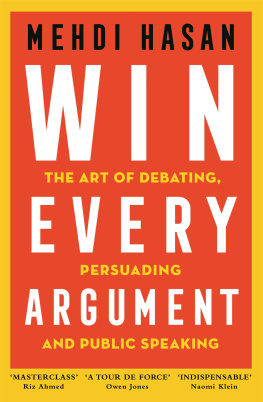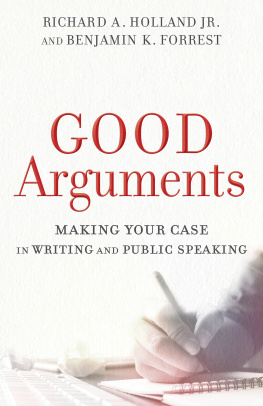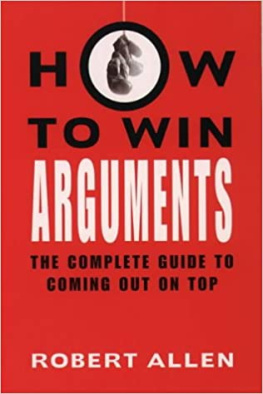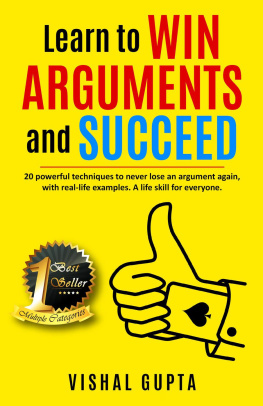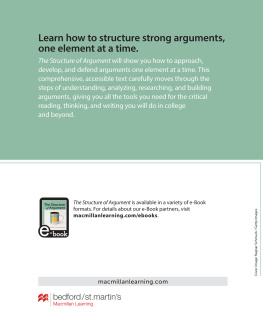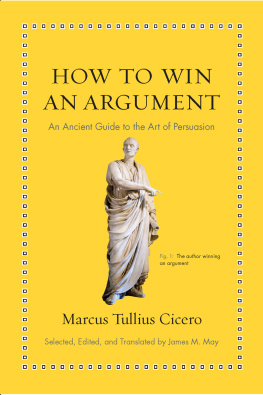MEHDI HASAN
WIN
THE ART OF DEBATING,
EVERY
PERSUADING
ARGUMENT
AND PUBLIC SPEAKING

To my wife, the love of my life, and the only person I can never seem to win an argument with.
CONTENTS
In troducti on
THE ART OF THE ARGUMENT
Im not arguing, Im just explaining why Im right.
Anonymous
W hat would you do if tens of thousands of lives depended on you winning an argument?
In 428 BCE, Ancient Greece was in the midst of the Peloponnesian War. The city-states of Athens and Sparta were locked in all-out conflict, struggling for the upper hand. With the two powerhouses distracted, the tiny city of Mytilene, on the Greek island of Lesbos, saw an opportunity. The oligarchs in charge of the city wanted to throw off Athenian rule and make a push to take full control of the island. Egged on by their Spartan allies, the oligarchs launched what became known as the Mytilenean Revolt.
It was a disaster for the Mytileneans. Athens wasnt as distracted as the oligarchs had hoped. The Athenian forces besieged Mytilene from all sides, before the city was even ready for battle. And it crushed Mytilenes nascent insurrection. The Mytilenean leaders were forced to surrender to Athenian general Paches, but the general didnt take it upon himself to decide how to punish the rebels. Athens was still a democracy, after all. He allowed the defeated city to send a delegation of a thousand men to Athens to beg for mercy.
As the ancient Greek historian Thucydides narrates in his History of the Peloponnesian War, the Athenian assembly gathered to vote on what action to take against Mytilene. It didnt take long to decide. The Athenians were infuriated by the Mytilenean Revoltand they were also afraid. What if other cities in their empire followed Mytilenes lead and rebelled against Athens? It would be the end of the Athenian empire.
The members of the assembly voted hurriedly and unanimously for a stark punishmentto execute all the men in Mytilene and to enslave the women and children. Straight after the vote, a triremethe fastest ship of that erawas dispatched to Lesbos with orders for Paches: wipe out the adult male population of Mytilene.
By the next morning, however, many Athenians were secondguessing the sheer brutality they had voted to inflict on the people of Mytilene. They wanted to consider a softer penalty. Athens being Athens, two orators were picked to debate the issue in front of the assembly.
The first was the general Cleon, described by Thucydides as the most violent man at Athens, who wanted to stick with the original punishment: killing and enslaving the Mytileneans. He addressed the assembly at length and urged his fellow Athenians to resist the calls for leniency. Cleon raged against Athenian democracy itself if it were to back down from the demands of war: I have often before now been convinced that a democracy is incapable of empire, and never more so than by your present change of mind in the matter of Mytilene. And he warned his listeners against becoming very slaves to the pleasure of the ear, and more like the audience of a rhetorician than the council of a city.
Punish them as they deserve, Cleon argued, and teach your other allies by a striking example that the penalty of rebellion is death.
Pity poor Diodotus. This leader of a more moderate Athenian political faction was tasked with making the case for clemency, and he had to speak right after Cleons rant. Thousands of lives hung in the balanceand time was not on his side. The trireme was already on its way to Lesbos. For that matter, Diodotus was now defending the soul of Athenian democracy, in the face of the vengeful anger of his opponents. Can you imagine the pressure he was under?
Despite that pressure, Diodotus began slowly, his calmness a stark contrast to Cleons rage: I do not blame the persons who have reopened the case of the Mytileneans, he said, nor do I approve the protests which we have heard against important questions being frequently debateda dig at Cleons scorched earth tirade. Diodotus instead built his argument around the importance of free and open debate, warning his audience how haste and passion were the two biggest obstacles to good counsel.
For Diodotus, the case against a mass execution didnt rest on the guilt or innocence of the Mytileneans. He conceded that they had indeed revolted against Athensbut he argued only for the oligarchical ringleaders to be punished. His was an argument of expediency, of realpolitik: killing all the Mytilenean men would not be in the interests of the Athenians. It would be a blunder, he said, to exclude rebels in other revolting cities from the hope of repentance and an early atonement of their error. Nor, he added, was there any evidence that a mass execution would act as a deterrent to future insurrections.
The coolheaded Diodotus knew his audienceand what they needed to hear. He also understood the importance of rational argument, and he set the tone for it, eloquently deflecting Cleons call for vengeance. The good citizen, argued Diodotus, ought to triumph not by frightening his opponents but by beating them fairly in argument.
And beat Cleon he did, notes one writer. The assembly voted againand, this time, narrowly decided in Diodotuss favor. A second trireme with new orders was then sent off in haste to Lesbos, writes Thucydides, with wine and barley-cakes provided to the oarsmen and great promises made if they arrived in time. Thankfully, their trireme pulled into port just as Paches was reading the original decree brought to him by the first ship. The massacre was prevented, with only moments to spare.
Thousands of innocent lives were saved. All thanks to a single argument made back in Athens. An argument that Diodotus was able to win because he excelled at the art of debating, persuading, and public speaking. He knew not just how to craft a reasoned argument but also how to compose himself under pressure. He knew how to reach his audience, in their hearts, their minds, and the very core of their identity. He knew how to roll with his opponents haymakers and pick the critical opening to strike back. And when he did, Diodotus knew exactly how to use Cleons weaknesses to his advantage. He knew how to go in the underdog and come out the victor.
The point of this book is to show you all the tools and tactics that Diodotus, and all the worlds greatest speakers and debaters, employed. So you, too, can win every argument. Even when thousands of lives arent riding on it.

E very single person on the face of the planetevery man, woman, and childhas, at some moment or another, tried to win an argument. Whether it is in the comments section on Facebook, or in the marble hallways of Congress, or at the Thanksgiving dinner table. Whether theyve trounced their opponent or walked away sullen, everyone might then imagine all the things they could and should have said. Weve all been there. We cannot escape the human urge, need, andyesdesire to argue.
But arguing itself tends to get a bad rap. Its blamed for everything from political polarization to marital breakdown. In his 1936 classic,

